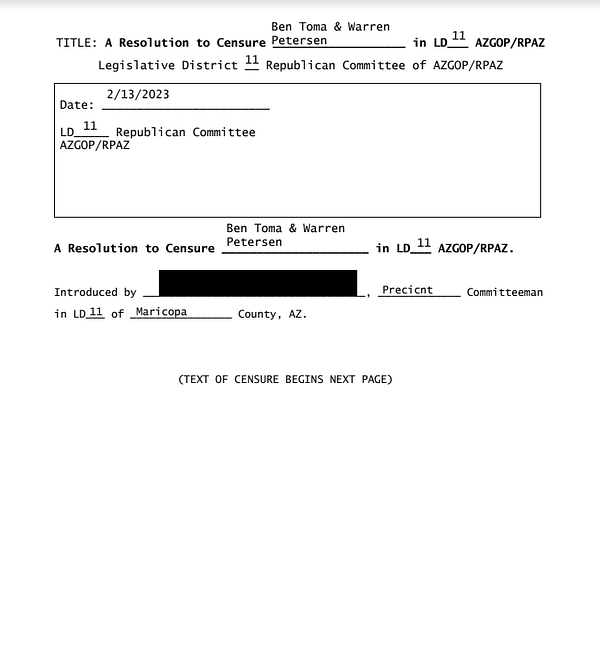The Daily Agenda: Hobbs declares war on Mexico ... Commission
Fire the commissioners ... Hire the directors ... And we're sorry, but the return of the Valley's most phallic tagger.
Around the time she was meeting with Mexican President Andrés Manuel López Obrador and new Sonora Gov. Alfonso Durazo on Friday, Gov. Katie Hobbs cleaned house at the Arizona-Mexico Commission, firing the entire 26-member board of directors.
The commission facilitates commerce and strengthens political ties between Arizona and Mexico through meetings with political and business leaders, committees focused on different aspects of binational trade and research designed to influence policy in the two nations. It’s something of a government-sponsored chamber of commerce for international trade with Mexico, and its board members serve at the pleasure of the governor.
Its board was stacked with movers and shakers from the border and business regions, all of whom got a five-sentence letter Friday afternoon announcing their services were no longer needed since Hobbs would be appointing all new commissioners, though they were free to reapply. By Monday, they had all been scrubbed from the commission’s website, which now features just a photo of Hobbs.

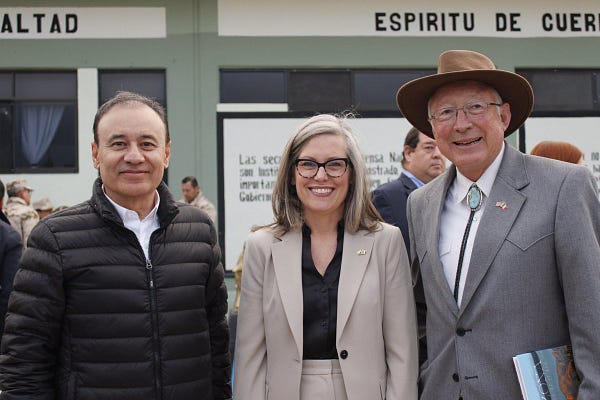
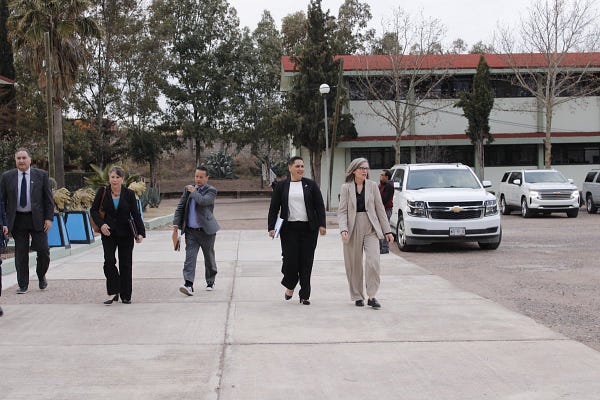
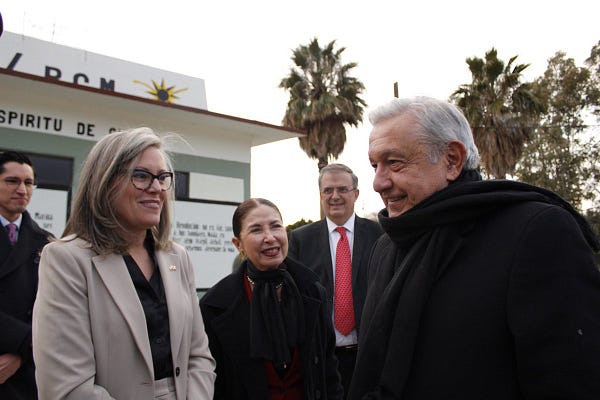
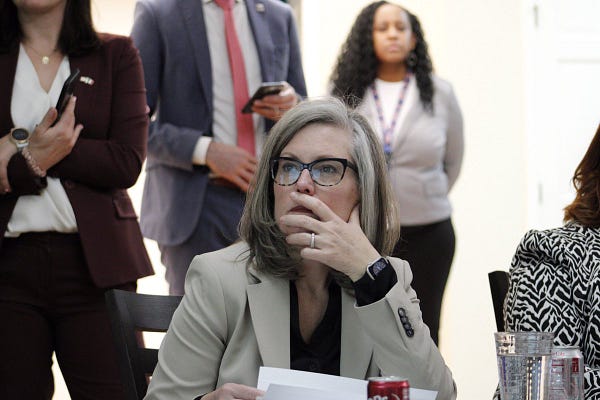
The Friday firings sent shockwaves through the business community or, at least those closely aligned with former Gov. Doug Ducey — the same folks who were still reeling from Hobbs’ abrupt announcement last week that she had canceled many of the last-minute contracts that Ducey gave them.
Improving relations with Mexico was one of Ducey’s earliest and most urgent priorities. The Arizona-Mexico Commission was one of his strongest tools in helping boost Arizona’s image among Mexicans following SB1070 and former Maricopa County Sheriff Joe Arpaio’s racial profiling cases. Many of the now-former members are pragmatic people from the business community who dabble in politics or vice versa.
While cleaning house at various agencies may be standard for a new administration, it hasn’t been at the commission. A few of the fired members of the commission had been there for decades, dating back to former Gov. Janet Napolitano.
Still, it was largely a Ducey-centric commission. Ducey’s former Chief of Staff Kirk Adams was on the commission, as was Jessica Pacheco, a former APS lobbyist; Jonathan Lines, former AZGOP chair and Russ Jones, former chair of the Yuma County Republican Party.
Hobbs certainly has the prerogative to stack the commission with her own allies, to start fresh with people she feels can best carry out her vision of the commission. Positions on the commission are highly coveted gigs that help the consultant class get richer through connections and business opportunities. The new governor can use those positions to fulfill political debts from the campaign or rack up goodwill among those who may be in a position to help or hurt her agenda.
But many of these members of the commission’s board are already potential Hobbs allies, or at least they’re the kind of people she’ll likely need help from if she wants to govern and win reelection. Firing them en masse isn’t likely to help.
Bolles bill lives: Our bill to allow a monument at the Capitol mall honoring murdered journalist Don Bolles is scheduled for a vote from the full House tomorrow. You can tune in to the House “third reading” at about 10 a.m. to see who votes for or against House Bill 2171.
It’s a grueling process: The Arizona Senate committee tasked with vetting Gov. Katie Hobbs’ appointees to lead state agencies unanimously approved her pick for the Department of Transportation, Jennifer Toth, the former leader of the Maricopa County Transportation Department, Capitol scribe Howie Fischer notes. But after grilling Elizabeth Alvarado-Thorson, Hobbs’ pick to lead the Department of Administration, committee chair Jake Hoffman wouldn’t allow her to receive a vote, saying she wasn’t transparent with her answers and he wants to grill her some more, the Arizona Mirror’s Caitlin Sievers writes.
More subpoenas: The U.S. Justice Department subpoenaed several Arizona lawmakers as part of its investigation into Trump’s actions after the 2020 election, the Arizona Mirror’s Jim Small reports. Senate President Warren Petersen, House Speaker Ben Toma, Sen. Sonny Borrelli, and former Sen. Michelle Ugenti-Rita were told to turn over communications with Trump and a list of his associates and were asked to testify in Washington.
Speaking of: Petersen, in his seventh term as a lawmaker, is by no means a moderate. He plans to advance a heavily GOP agenda that includes “everything” and prevent Hobbs from achieving her goals, the Republic’s Ray Stern writes in a profile of Petersen. He shares how his faith as a member of the Church of Jesus Christ of Latter-day Saints and upbringing in a big family that dealt with poverty and health problems inform his lawmaking. Two of his siblings served on local town councils in the Valley.
The devil’s in the nonexistent details: Scottsdale and Maricopa County are “working on an agreement” to restore water access to Rio Verde Foothills, an unincorporated area that was previously getting water from the City of Scottsdale, which cut off access, the Republic’s Sasha Hupka reports. The community’s lack of water made national headlines, and a solution has so far proved elusive. There are scant details on what such an agreement could entail, and it would still require approval from elected officials in both the city and county.
The harassment continues: A drag story hour for children at a Tempe coffee shop was canceled after a bomb threat, the Republic reports. Drag Story Hour Arizona’s event at Brick Road Coffee was “targeted over the last week by the Proud Boys and other hate groups” as drag and other LGBTQ events face harassment and legislation that could criminalize drag performance.
What your lawmakers are working on: Here are some bills moving through the Legislature.
TikTok could be banned on state government devices.
A Democratic bill seeks to protect franchisees of chains like McDonald’s from abrupt contract cancellations.
One proposal would ban sales or leases of state land to foreign governments and companies headquartered in certain countries, though not Saudi Arabia.
A GOP plan to end food and rental taxes is running into big opposition from cities and towns.
A Republican bill seeks to kick people off the state’s Medicaid program more quickly.
One grocery store to rule them all: Attorney General Kris Mayes could try to block a planned merger between Kroger and Albertsons, which own Arizona’s two largest grocery store chains, Capitol Media Services’ Howie Fischer reports. Mayes said she’s investigating the merger to see how it’ll affect prices, workers and potential store closures while weighing whether and how to get involved.
Council vs council: Phoenix could stop allowing elected officials to use a city-owned suite at the Footprint Center, where the Phoenix Suns play, after Axios Phoenix’s Jessica Boehm reported on several uses by officials and their staff in recent years. While council members Laura Pastor, Carlos Garcia, Betty Guardado and Yassamin Ansari have defended their use of the suite as meeting city guidelines to attract businesses, the usage has factored into council divisions and the upcoming city runoff elections.
Nobody likes experts: The experts who’ve shown up in Arizona committee hearings and local meetings to share election fraud theories may have advanced degrees in fields like data analysis or cybersecurity, but that doesn’t mean they actually know elections, the Arizona Capitol Times’ Kiera Riley reports. In recent weeks, Arizona Sen. Wendy Rogers’ elections committee has featured many of these experts, though they aren’t vetted or held to the same rules they would be in a courtroom.
Tired of winning yet?: Kari Lake’s attempt to install herself as Arizona’s governor failed yet again, with the state Court of Appeals shooting down her lawsuit last week. The court upheld a lower court ruling by saying Lake did not present evidence to show widespread disenfranchisement, misconduct or fraud and instead represented “sheer speculation.” Lake predictably spun the results, rebranding the court loss as keeping a “promise” to take the election lawsuit to the Arizona Supreme Court. She completed her rebrand with another predictable move: linking to a fundraising page.



On the pre-campaign trail: A man threatened to drive into a building where Lake was speaking during her recent swing through Iowa, the Des Moines Register reports. Lake’s security said the man was acting strange when he said he’d drive into the venue, but police say the man didn’t make specific threats and they don’t believe he committed a crime, though it’s still under investigation. He also said he was God and told a bartender his favorite color (purple).
If at first you don’t succeed: Jevin Hodge, a young Democrat who’s now narrowly lost two elections, could try again to win in Congressional District 1, he told the Republic’s Tara Kavaler. Hodge lost to incumbent Rep. David Schweikert in the closest congressional race in Arizona, losing by just under 3,200 votes. The unexpectedly close race showed that the new CD1 could be in play for Democrats, with the right candidate and more investment.
A worthy goal: The City of Phoenix has a new “Office of Homeless Solutions” tasked with finding ways to address homelessness, the Republic’s Juliette Rihl reports. The office’s first priority is to increase available shelter beds as soon as possible.
Today’s recommended longread: An 83-year-old man who owns property with cows grazing on it near Grand Canyon University is in a protracted battle with the university over his cows, whose “smell of manure wafts over GCU’s manicured lawns and stately lecture halls,” the Phoenix New Times’ Katya Schwenk reports. Gail Palmer, the “cow guy,” is one of few holdouts who hasn’t sold his property to the ever-expanding university.
An example of the terrible health care in Arizona prisons: A man imprisoned in Arizona is being prosecuted for aggravated assault because he splashed water at a guard during a mental health episode, the New Times’ Schwenk reports. The man, Bruce Beekman, was not being properly treated for his mental illness when the incident happened. He was also pepperballed during it.
“It’s a waste of resources, it’s a miscarriage of justice, it’s a manifest injustice to prosecute this man given the circumstances of this particular case,” said Donna Hamm, executive director of Middle Ground Prison Reform.
They suddenly care about money in politics: Republican lawmakers continue to press Hobbs over her inaugural fundraising and the leftover money from her massive cash haul, the Arizona Capitol Times’ Nick Phillips reports. They held a hearing over a bill to require more disclosure for inauguration funds, inviting attorney Timothy La Sota, who worked on Lake’s campaign, to testify on the appropriateness of the fund.
No choice: Phoenix voted to start auctioning off more than 1,400 guns confiscated by law enforcement because state law requires the city to do so, the Republic’s Taylor Seely reports. The council didn’t want to resell the guns but could risk a state investigation and potential withholding of revenues if they didn’t comply with the law that was originally aimed at stopping Tucson from destroying guns.
The end of the road: The University of Arizona plans to sell former Gov. Raúl Castro’s Nogales home after years of failed attempts to use the site as a border studies center, the Nogales International’s Angela Gervasi reports. The university will sell the house and donate the proceeds to a scholarship in Castro’s name.1




